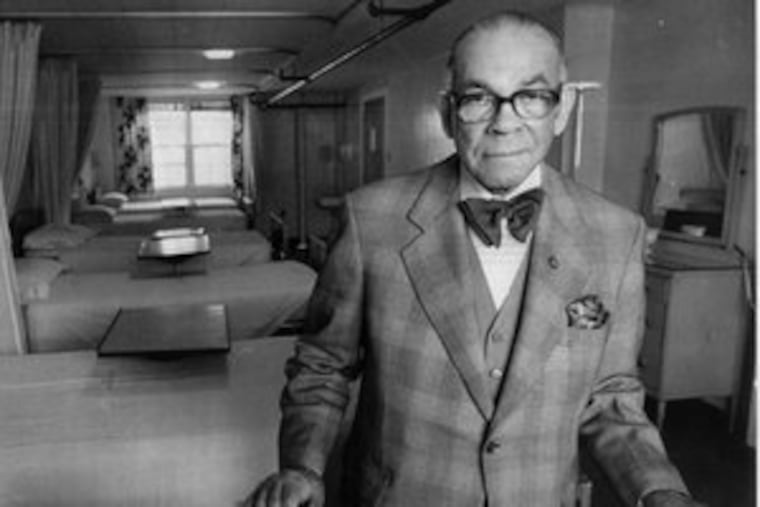Marker honors spirit of hospital's founder
A doctor struck out on his own in the 1930s to help African American patients in Coatesville.

When Whittier Clement Atkinson arrived in Coatesville in 1927 with his newly minted medical degree, he landed in a city still raw from a lynching 16 years earlier. Racism was a daily fact of life.
The African American physician was spurned by his peers at Coatesville Hospital. His patients were routinely turned away from the hospital. When they were admitted, Atkinson was never consulted about their treatment.
So, in 1936, at the height of the Depression and with few resources other than his own, Atkinson opened a small hospital next to his home in the 800 block of East Chestnut Street.
That institution, which was one of just seven black hospitals in the state, grew into a clinic that has served thousands of patients and generations of families over the years.
Today, Atkinson's many contributions to his community and to medicine will be celebrated when a commemorative marker from the Pennsylvania Historical and Museum Commission is dedicated in front of the old red-brick hospital. The event will be the climax of the 30th annual Conference on Black History in Pennsylvania, which concludes today at Lincoln University.
Ironically, the dedication comes just a few weeks before the clinic shuts its doors.
Since its opening, the clinic has symbolized the need to fill in the health-care gaps for poor and minority communities. The mission has expanded as the community's needs have grown. The clinic part of the operation can now be closed because its services are duplicated elsewhere in the city, but other aspects will continue.
Karen James, the black history programs manager for the commission and one of the conference organizers, said she was excited to bring people from around the state to Coatesville for the dedication.
"Their thoughts of Coatesville are of 1911," the year of the lynching, she said. "It's good for them to come in and see this little community."
Clement Atkinson Memorial Hospital - named for the doctor's father - grew from five beds to 60 and became a full-service facility for the African American community, said Minnetter Patterson Winfield, 76, a registered nurse who worked there for five years in the 1950s.
"We had all the different services - medical, surgical, pediatrics, maternity," she said. "We had our own lab, our own X-ray - I learned a lot there." She went on to become the first African American nurse at the VA Hospital in Coatesville.
Winfield came to Coatesville from her home in North Carolina. She had heard about Atkinson's work from a fellow nurse at the Winston-Salem hospital where she trained.
"I came here scared to death," she said. "I was young, I was leaving home, and I was the baby of my family, but Dr. Atkinson and his wife took me in like I was their own child."
The hospital served the community for more than 40 years, until it closed in 1978. By then, the once-shunned Atkinson had served as the first African American president of the Chester County Medical Society and had been named general practitioner of the year by the Pennsylvania Medical Society.
But 13 years after his hospital closed, Minnie McNeil, one of his former nurses, saw a need and acted to fill it. With the help of her church, the Allegheny East Conference of Seventh-day Adventists, the hospital building was purchased from the doctor's family and it became the home of W.C. Atkinson Memorial Community Center Inc.
In partnership with Brandywine Hospital, a primary-care clinic was established in the basement. But McNeil saw other needs.
She opened a 22-bed homeless shelter for men on the first floor. That was followed by transitional housing, where men can live for up to two years as they put their lives back together. When they are ready for permanent housing, the center has townhouses they can rent.
"We believe that, as men are growing, their opportunities should grow as well," she said. "As the quality of their lives improves, they get jobs, and they become contributing members of the community."
The center's other outreach efforts now include a diabetic support group, wellness programs that are offered at area churches, and support groups for new mothers.
In 2006, ChesPenn Health Services, a federally qualified health center based in Chester, opened a satellite clinic a few blocks from Atkinson. With ChesPenn's ability to offer more services to more people, the Atkinson clinic will close next month - though the center's other programs will go on.
"We will continue to have a vibrant role in the health care of our community," said McNeil. "That's very important to us."
The dedication of the marker honoring Atkinson's spirit and mission is scheduled to take place from 2:30 to 4:30 p.m. today at Ninth Avenue and Chestnut Street in Coatesville. It is open to the public and includes a resource fair.
"It will be an offering to the community," said McNeil. "Everything we do is about empowering people to help themselves."